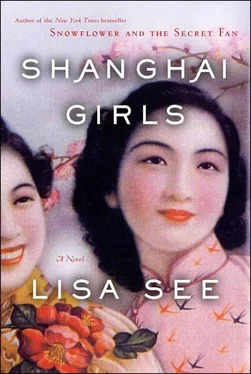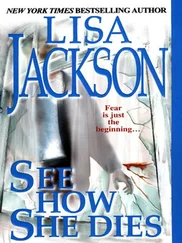“That’s fine,” I say. I nod to Sam, who’s behind the counter in the café, stir-frying an order in a wok. He’s the second cook now, but he can keep an eye on our daughter while I visit with May.
My sister and I swing through China City ’s alleyways toward the costume and prop shop that came to her through Tom Gubbins. It’s been ten years since we arrived in Los Angeles, ten years since we stepped into China City. When I first passed through the miniature Great Wall, I felt no connection to this place. Now it feels like home: familiar, comfortable, and much loved. This isn’t the China of my past-the busy streets of Shanghai, the beggars, the fun, the champagne, the money-but I see reminders of it here in the laughing tourists, the traditionally costumed shop owners, the smells that come from the cafés and restaurants, and the stunning woman at my side, who happens to be my sister. As we stroll, I catch glimpses of us in the shopwindows and I’m transported to our girlhoods: the way we dressed in our room and stared at our reflections and those of our beautiful-girl images that hung on the walls around us, the way we walked together along Nanking Road and smiled at ourselves in store windows, and the way Z.G. captured and painted our perfect selves.
And yet we’ve both changed. Now I see myself-thirty-two years old, no longer a new mother but a woman content with herself My sister is a flower in full bloom. The desire to be looked at and admired still burns from deep within her. The more she feeds it, the more she needs. She’ll never be satisfied. This malady is in her bones-from birth, her essential character, her Sheep that wants to be taken care of, petted, and admired. She isn’t Anna May Wong and she never will be, but she gets more movie work and more varied roles-as a whimsical cashier, the giggly but ineffectual maid, or the stoic wife of a laundryman-than anyone else in Chinatown. This makes her a star in our neighborhood and a star to me.
May opens the door to her shop and flips on a light, and there we are-surrounded by the silks, embroideries, and kingfisher feathers of the past. She makes tea, pours it, and then asks, “So what’s this thing you’re so eager to tell me?”
“Ten thousand happinesses,” I say. “I’m pregnant.”
May clasps her hands together. “Really? Are you sure?”
“I went to the doctor.” I smile. “He says it’s true.”
May gets up, comes to me, and hugs me. Then she pulls away. “But how? I thought-”
“I had to try, didn’t I? The herbalist has been giving me wolfberry fruit, Chinese yam, and black sesame to put in our soup and other dishes.”
“It’s a miracle,” May says.
“Beyond a miracle. Unlikely, impossible-”
“Oh, Pearl, I’m so pleased.” Her joy mirrors mine. “Tell me everything. How far along are you? When is the baby coming?”
“I’m about two months.”
“Have you told Sam yet?”
“You’re my sister. I wanted to tell you first.”
“A son,” May says, smiling. “You’re going to have a precious son.”
Everyone has this desire, and I flush with pleasure just hearing the word -son .
Then a shadow crosses May’s face. “Can you do this thing?”
“The doctor says I shouldn’t be so old, and I have my scars.”
“Women older than you have babies,” she says, but this isn’t the best thing to say given that Vern’s problems are often blamed on Yen-yen’s age. May winces at the insensitivity of her remark. She doesn’t ask about the scars, because we never talk about how I came to get them, so she shifts to more traditional questions about my condition. “Are you sleepy all the time? Are you sick to your stomach? I remember…” She shakes her head as if ridding herself of those memories. “They always say that life is extended only by having children.” She reaches over and touches my jade bracelet. “Think how happy Mama and Baba would have been.” May suddenly grins, and our sad feelings melt. “Do you know what this means? You and Sam have to buy a house.”
“A house?”
“You’ve been saving all these years.”
“Yes, for Joy to go to college.”
My sister brushes away that worry with a wave of her hand. “You have plenty of time to save for that. Besides, Father Louie will help you with the house.”
“I don’t see why. We have an arrangement-”
“But he’s changed. And this is for his grandson!”
“Maybe, but even if he does decide to help us, I wouldn’t want to be separated from you. You’re my sister and my closest friend.”
May gives me a reassuring smile. “You’re not going to lose me. You couldn’t even if you tried. I have my own car now. Wherever you move, I’ll come and visit.”
“But it won’t be the same.”
“Sure it will. Besides, you’ll come to China City every day to work. Yen-yen will want to take care of her grandson. I’ll need to see my nephew too.” She takes my hands. “ Pearl, buying a house is the right thing to do. You and Sam deserve this.”
SAM IS BEYOND thrilled. He may have once told me he didn’t care if he had a son, but he’s a man, and, for all his words, he’s needed and wanted a son very badly. Joy hops up and down with excitement. Yen-yen weeps, but my age concerns her. Father Louie, wanting to behave as a patriarch should, tries to capture his emotions in his clenched fists, but he can’t stop beaming. Vern stands by me, a kind but small protector. I don’t know if my posture is taller and straighter because I’m happy or if Vern is just shy around me, but he seems shorter and thicker-as though his spine is collapsing and his chest broadening. He should have grown out of the slouch of his teen years by now, but I often notice that he will lean over and put his hands on his thighs as though propping himself up from fatigue or boredom.
On Sunday the uncles come for dinner to celebrate. Our family-like so many in Chinatown -is growing. The Chinese population in Los Angeles has more than doubled since we first arrived. This isn’t because the Exclusion Act was overturned. We thought that was going to be wonderful when it happened, but only 105 Chinese a year are allowed to enter the country under the new quota. As always, people find ways to get around the law. Uncle Fred brought in his wife under the War Brides Act. Mariko’s a pretty girl, quiet, and Japanese, but we don’t hold it against her. (The war is over and she’s part of our family now, so what else can we do?) Other men have brought in wives through other acts, and when you have men and women together, you’re going to get children. Mariko had two babies one right after the other. We love Eleanor and Bess, even though they’re half-and-half, even though we don’t see them as much as we’d like. Fred and Mariko don’t live in Chinatown. They took advantage of the G.I. Bill to buy a house in Silver Lake, not far from downtown.
The men wear sleeveless undershirts and drink bottles of beer. Yen-yen-in loose black trousers, a black cotton jacket, and a really fine jade necklace-dotes on Joy and Mariko’s daughters. May swishes through the main room in a full-skirted American-style dress of polished cotton belted at the waist. Father Louie snaps his fingers, and we sit down to eat. My family use their chopsticks to snap up the best morsels to drop in my bowl. Everyone has advice. And surprisingly, everyone agrees that we should look for a house in which to raise the Louie grandson. And May was right. Father not only volunteers to help but says he’ll match us dollar for dollar as long as his name’s on the title too.
“Married people are starting to live away from their in-laws,” he says. “It will look strange if you don’t have your own home.” (Because after ten years he’s no longer afraid we’ll run away. We’re his true family now, just as he and Yen-yen are ours.)
Читать дальше












